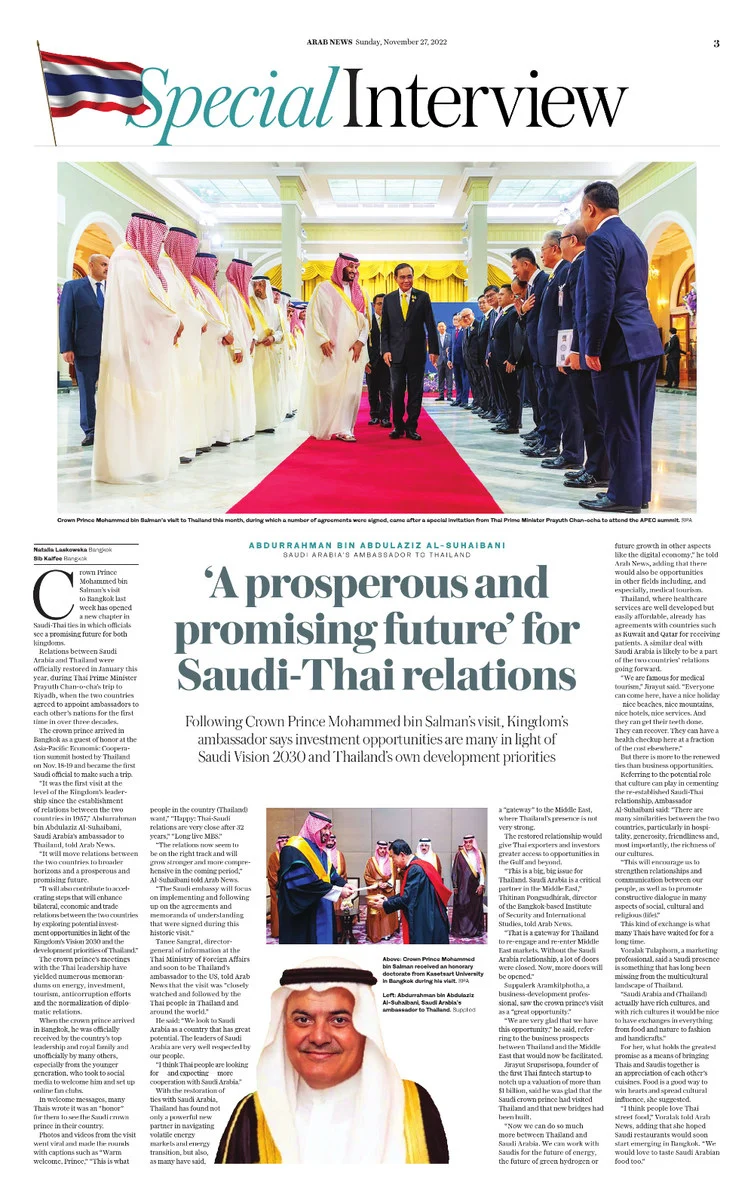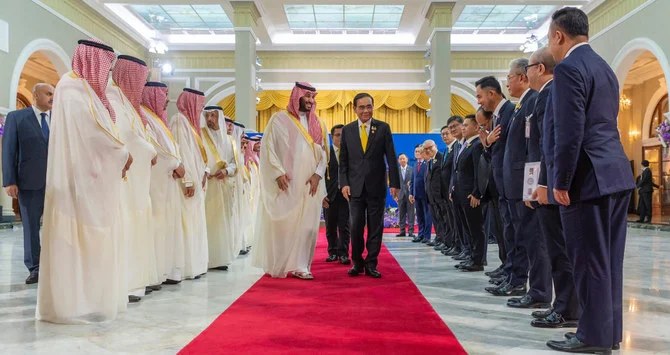BANGKOK: Crown Prince Mohammed bin Salman’s visit to Bangkok last week has opened not only a new chapter in Saudi-Thai ties but also new horizons in which officials and the people see a promising future for both kingdoms.
Relations between Saudi Arabia and Thailand were officially restored in January this year, during Thai Prime Minister Prayuth Chan-o-cha’s trip to Riyadh, when the two countries agreed to appoint ambassadors for the first time in over three decades.
The crown prince arrived in Bangkok as a guest of honor at the Asia-Pacific Economic Cooperation summit hosted by Thailand on Nov. 18-19 and became the first Saudi official to make such a trip.
“It was the first visit at the level of the Kingdom’s leadership since the establishment of relations between the two countries in 1957,” Abdurrahman bin Abdulaziz Al-Suhaibani, Saudi Arabia’s ambassador to Thailand, told Arab News.
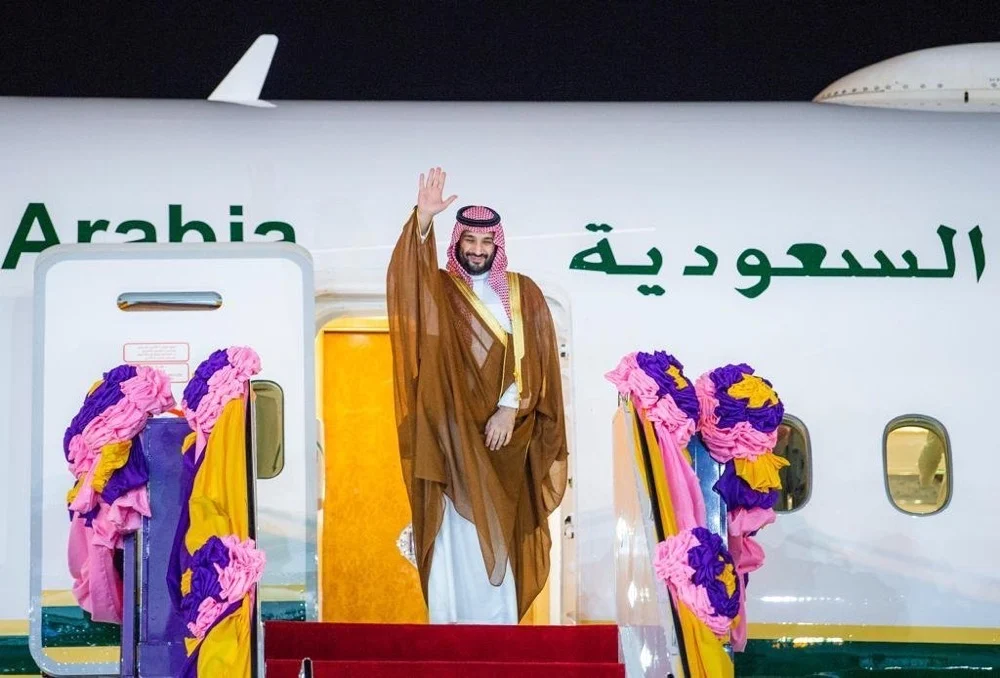
In welcome messages, many Thais wrote it was an “honor” for them to see the Saudi crown prince in their country. (SPA)
“It will move the relations of the two countries to broader horizons and a prosperous and promising future.
“It will also contribute to accelerating steps that will enhance bilateral, economic and trade relations between the two countries by exploring potential investment opportunities in light of the Kingdom’s Vision 2030 and the development priorities of Thailand.”
The crown prince’s meetings with the Thai leadership have yielded numerous memorandums on energy, investment, tourism, anticorruption efforts and the normalization of diplomatic relations.
When the crown prince arrived in Bangkok, he was officially received by the country’s top leadership and royal family and unofficially by many others, especially from the younger generation, who took to social media to welcome him and set up online fan clubs.
In welcome messages, many Thais wrote it was an “honor” for them to see the Saudi crown prince in their country.
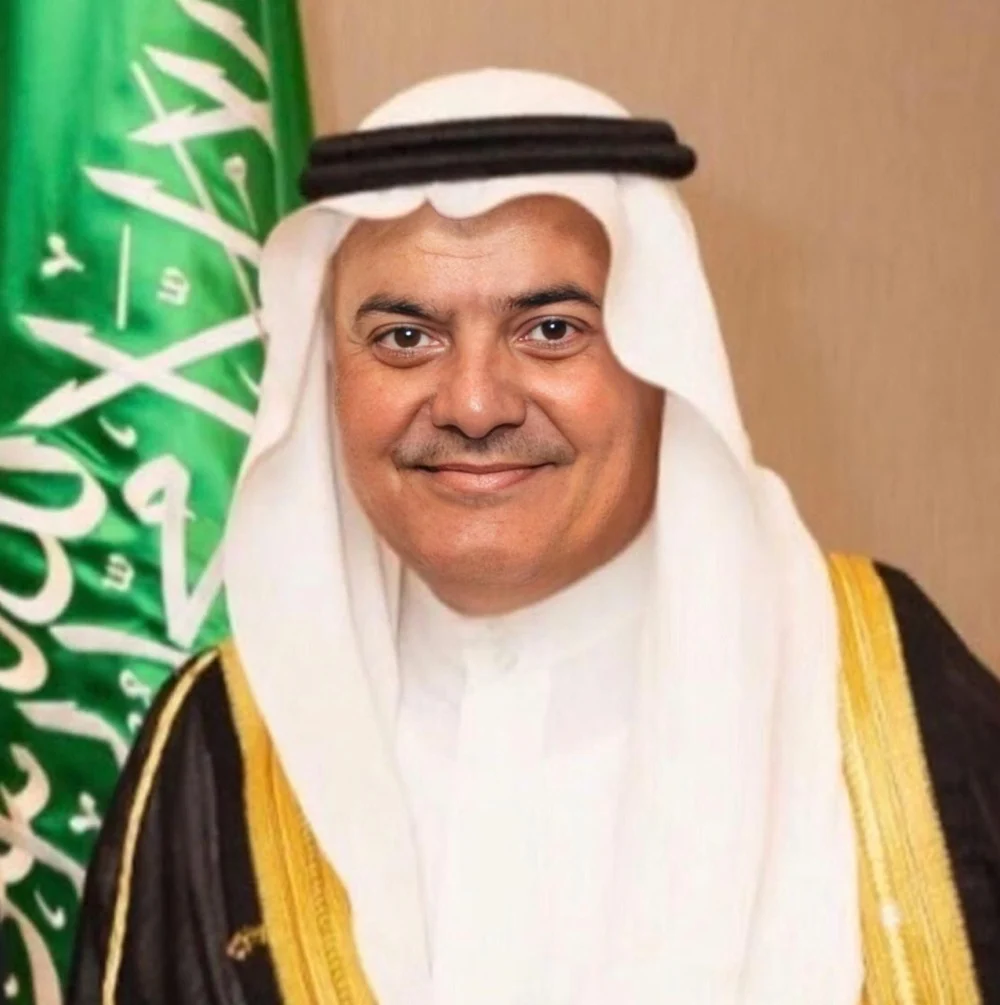
“I think Thai people are looking and are expecting more cooperation with Saudi Arabia,” Abdurrahman bin Abdulaziz Al-Suhaibani, Saudi Arabia’s ambassador to Thailand, told Arab News. (Supplied)
Photos and videos from the visit went viral and made the rounds with captions such as “Warm welcome, Prince,” “This is what people in the country (Thailand) want,” “Happy: Thai-Saudi relations are very close after 32 years,” “Long live MBS.”
“The relations now seem to be on the right track and will grow stronger and more comprehensive in the coming period,” Al-Suhaibani told Arab News.
“The Saudi embassy will focus on implementing and following up on the agreements and memoranda of understanding that were signed during this historic visit.”
Tanee Sangrat, director-general of information at the Thai Ministry of Foreign Affairs and soon-to-be Thailand’s ambassador to the US, told Arab News that the visit was “closely watched and followed by the Thai people in Thailand and around the world.”
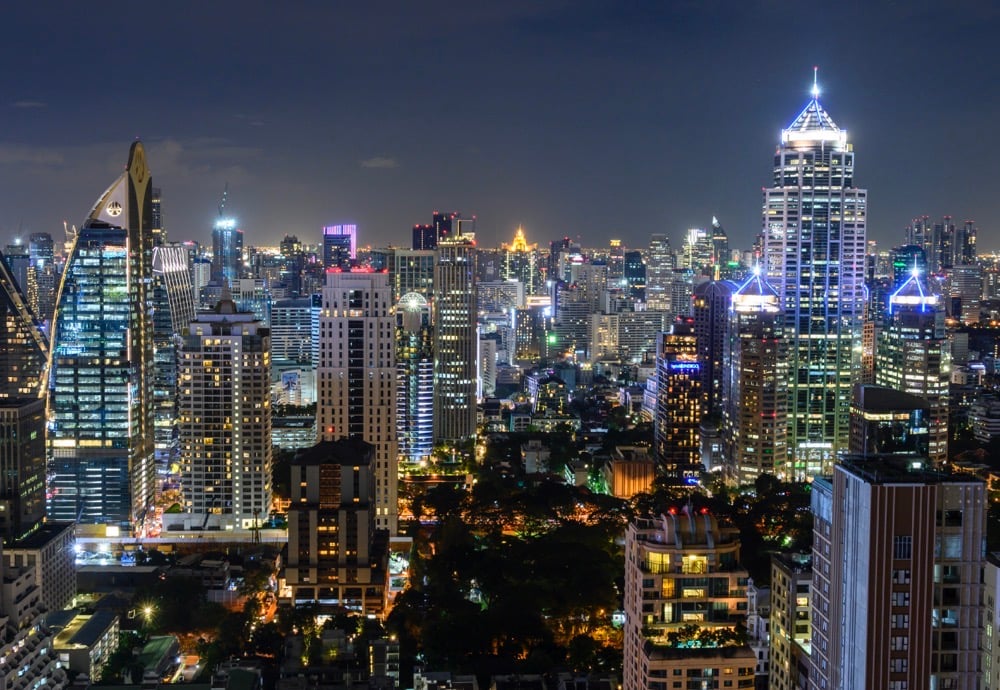
Thai Prime Minister Prayuth Chan-o-cha’s trip to Riyadh in January. (Shutterstock)
He said: “We look to Saudi Arabia as a country that has great potential. The crown prince and prime minister is very widely well respected by our people.
“I think Thai people are looking and are expecting more cooperation with Saudi Arabia.”
With the restoration of ties with Saudi Arabia, Thailand has found not only a new powerful partner in navigating volatile energy markets and energy transition, but also, as many have said, a “gateway” to the Middle East, where Thailand’s presence is not very strong.
The restored relationship would give not only Thai exporters but also investors more access to opportunities in the Gulf and beyond.
“This is a big, big issue for Thailand. Saudi Arabia is a critical partner in the Middle East,” Thitinan Pongsudhirak, director of the Bangkok-based Institute of Security and International Studies, told Arab News.
“That is a gateway for Thailand to re-engage and re-enter Middle East markets. Without the Saudi Arabia relationship, a lot of doors were closed. Now, more doors will be opened.”
Suppalerk Aramkitphotha, a business development professional, saw the crown prince’s visit as a “great opportunity.”
“We are very glad that we have this opportunity,” he said, citing the business prospects between Thailand and the Middle East that would now be facilitated.
Jirayut Srupsrisopa, the founder of the first Thai fintech startup to notch up a valuation of more than $1 billion, said he was glad that the Saudi crown prince visited Thailand and new bridges were built.
“Now we can do so much more between Thailand and Saudi Arabia. We can work with Saudis for the future of energy, the future of green hydrogen or future growth in other aspects like the digital economy,” he told Arab News, adding that there would also be opportunities such as medical tourism.
Thailand, where healthcare services are well developed, already has agreements with countries such as Kuwait and Qatar for receiving patients. A deal with Saudi Arabia is likely to be a part of the two countries’ relations going forward.
“We are famous for medical tourism,” Jirayut said. “Everyone can come here, have a nice holiday, nice beach, nice mountains, nice hotels, nice services. And they can get their teeth done. They can recover. They can have a health checkup here at a fraction of the cost elsewhere.”
But there is much more to the renewed ties than business opportunities.
Referring to the potential role that culture can play in cementing the re-established Saudi-Thai relationship, Ambassador Al-Suhaibani said: “There are many similarities between the two countries, particularly in hospitality, generosity, friendliness and, most importantly the richness of culture.
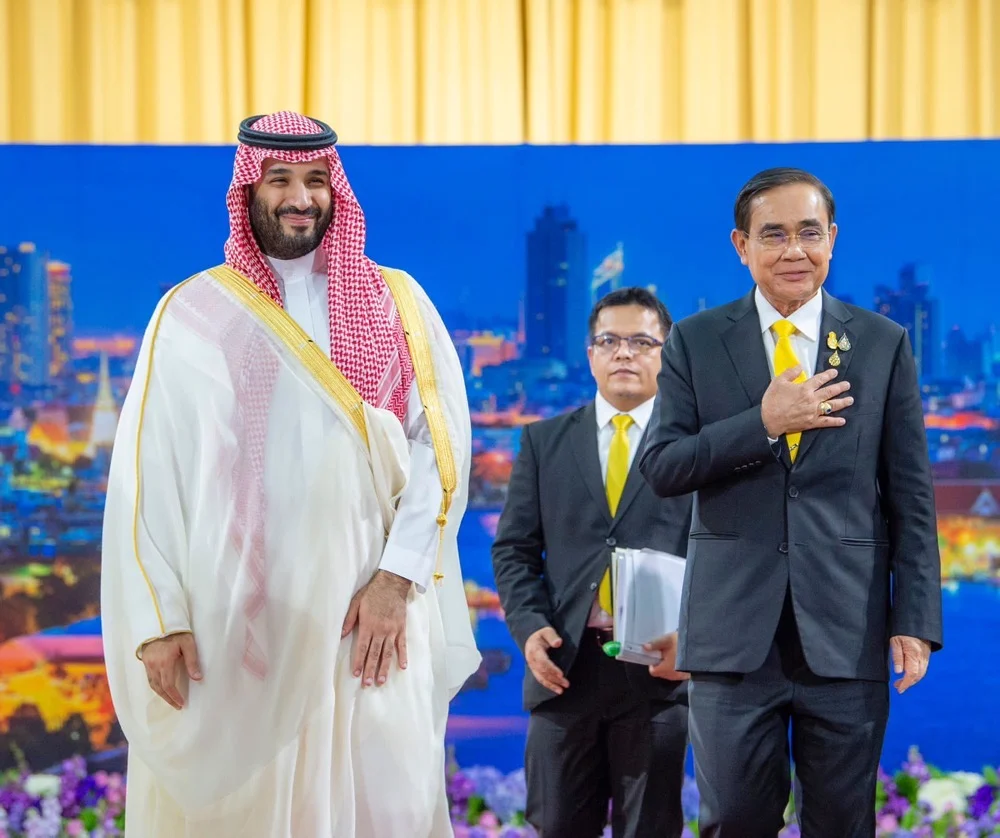
Crown Prince Mohammed bin Salman and the Thai Prime Minister witness the exchange of several MoU between Saudi Arabia and Thailand. (Supplied)
“This will encourage us to strengthen relationships and communication between our people, as well as to promote constructive dialogue in many aspects of social, cultural and religious (life).”
This kind of exchange is what Thais have waited for a long time.
Voralak Tulaphorn, a marketing professional, said a Saudi presence is something that was missing from the multicultural landscape of Thailand for a long time.
“Saudi Arabia and (Thailand) actually have rich cultures, and with rich cultures it would be nice to have exchanges in everything from food and nature to fashion and handicrafts.”
For her, what holds the greatest promise as a means of bringing Thais and Saudis together is an appreciation of each other’s cuisines. Food is a good way to win hearts and spread cultural influence.
“I think people love Thai street food,” Voralak told Arab News, adding that she hoped that soon Saudi restaurants would start emerging in Bangkok. “We would love to taste Saudi Arabian food too.”
